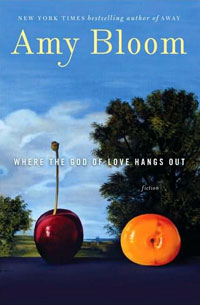Full Bloom

One ought not fault Amy Bloom’s admirers for pushing at the limits of sensible praise as one such does in describing Bloom’s new book, Where the God of Love Hangs Out (Random House) as “beautifully astute.” Not exactly a coupling of words that sings. If you have followed Ms. Bloom’s work there is a challenge to match her wonderful talent with commentary that does not come off like a publicist’s bouquet of superlatives and hyperbole.
The book is an interesting selection of short fictions. Four of them feature Claire and William, a pair of middle-aged academic adulterers (whose spouses are friends), with installments beginning in 2002 having been previously published. Then there are four stories devoted to Julia, a white women, and Lionel, her son by a famous black musician, and four tales not related to any of the others in this wonderful volume.
What is present in Amy Bloom’s fiction is both a concision of drama—there are not a many wasted gestures—and words that delivers a narrative accuracy. Even in forays into non-fiction the prose is requisite to the task at hand. Combine with a good-natured sense of humor and a seemingly unerring sense of the variegated responses people may have to their travails and you have a sure-fire recipe for good storytelling.
In her introduction to her guest-edited issue of Ploughshares, Bloom concluded:
All of these are real stories, not sketches, not anecdotes, not a sudden splicing of language. They have heft (even the funny pieces have the necessary muscle and mass to plant something that matters in the heart of the cleverness and not let clever run away with the show); they have lyricism grounded in story and life, so that it is not mere, and even annoying, filigree; they have things observed and people understood in language that opens out, past information, into another, less conscious light. These are the kinds of stories I like.
Ditto.
